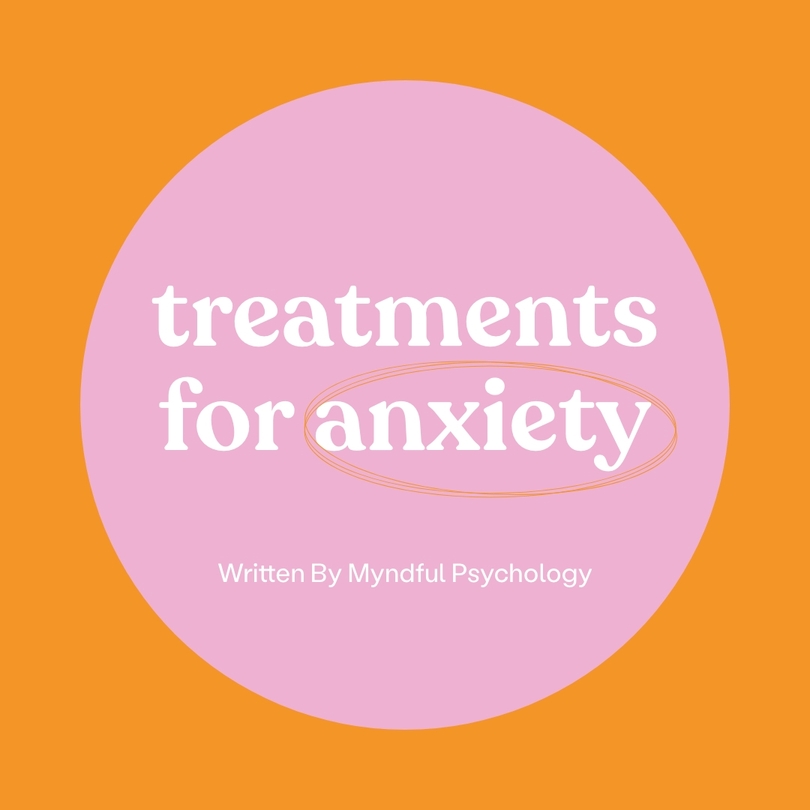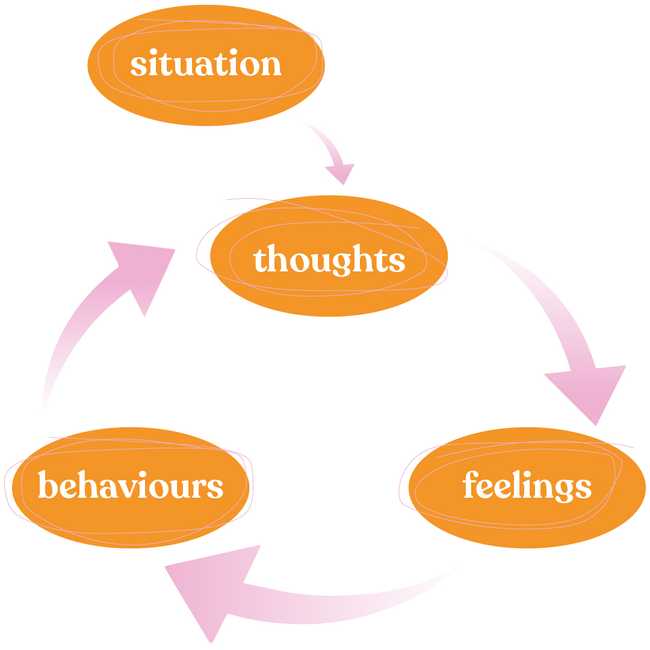Treating anxiety
If you are suffering from anxiety, what treatments are there, and which one is right for you? In this article we explore different treatments that can be used for anxiety.

Dr Aneta Kotevski
November 23, 2022
6 min read
#depression-and-anxiety

This article is part 4 in our series on anxiety. Now that you can recognise that you are experiencing anxiety, there are a variety of evidence-based psychological interventions that can treat anxiety. How do you know which is the best one for you?
In this article, we cover some of the most of up-to-date anxiety treatments that you may expect to receive in therapy with a Myndful psychologist.
Cognitive Behaviour Therapy (CBT)
Cognitive behaviour therapy (CBT) is a psychological treatment based on the premise that how you think about yourself, the world and other people influence how you feel and what you do. Similarly, what you do and how you behave affects your thoughts and feelings.
This means a situation experienced in our daily lives (e.g., a problem, event or difficulty) impacts on how we think, feel, behave and where it is experienced in our body (physiological changes such as increased heart rate).

CBT can help you make sense of overwhelming problems that cause anxiety by breaking them down into smaller parts. It skills you with strategies for a better quality of life by understanding and targeting factors that maintain psychological distress in everyday life.
There are helpful and unhelpful ways to respond to situations, depending on how you think about them. The goal of CBT is to change or challenge ‘unhelpful’ thoughts and beliefs into positive and helpful alternatives so that you feel better and engage in behaviour that is positive and adaptive. For example, a person with social anxiety who is invited to a friend's birthday party (situation), worries that they will not know anyone and be judged by others (thoughts). Subsequently, the feel worried and anxious (emotions), and decide to stay at home instead (behaviour). CBT can you challenge and change how you think, to improve how you feel and do what matters most to you.
Acceptance and Commitment Therapy
Acceptance and commitment therapy (ACT) is an effective psychological intervention for anxiety with two main components:
- accept what it out of your personal control and
- commit to action that improves and enriches your life.
In ACT, a person learns skills to accept of the full range of subjective experiences, including distressing thoughts, beliefs, sensations, and feelings to improve quality of life. A key principle is that attempts to control anxiety is not only ineffective but even counterproductive resulting in increased emotional distress. Instead, people feeling anxious are encouraged to connect with their experiences fully (pleasant or unpleasant) in a safe way, but without defence while moving toward valued goals.
ACT also helps you to identify values (e.g., what is important to you, how you want to treat yourself and others, doing what matters) and assist you to move towards meaningful action that improves your life in the long run.
Mindfulness-Based Cognitive Therapy (MBCT)
Mindfulness-based cognitive therapy (MBCT) uses mindful approaches and mindfulness meditation as the primary therapeutic technique for anxiety treatment. Mindfulness is a cognitive discipline that involves training attention. It teaches us how to use the mind to focus on the things that are most useful and helpful in our lives, in the present moment, encouraging a move towards a life that matters and enriches us.
When we are not paying attention, we often make mountains out of mole hills and perceive stressors that don't even exist. This amplifies our level of stress and anxiety enormously which takes a toll on our mental and physical health.
MBCT focuses on changing our relationship to thoughts, rather than challenging them. The aim is to experience thoughts and situations in the present time as they are (whether pleasant or unpleasant) and learning ways to let go or redirect our focus so that we experience less stress and anxiety.
Schema Therapy
Schema Therapy is another effective treatment for anxiety and trauma. A schema is a belief and feeling about oneself and the environment that is accepted without question. They are extremely stable, enduring negative patterns of thinking developed during childhood or adolescence and is perpetuated throughout a person's life. They can be self-limiting, emotionally distressing, and very resistant to change. For instance, children who develop a schema that they are unsafe rarely challenge this belief, even as adults, resulting in high levels of chronic anxiety and ineffective coping strategies. The schema usually does not go away without therapy.
Schema therapy involves experiential techniques such as visual imagery, limited re-parenting, chair work/parts work and the healing experiences of a validating psychological to create long lasting emotional and psychological well-being.
Eye Movement Desensitisation Reprocessing (EMDR)
EMDR is an evidence-based treatment developed by Francine Shapiro to assist clients exposed to traumatic events as well as anxiety, panic attacks and phobias. The technique uses bilateral stimulation, such as eye movements or tactile stimulation, to help the brains natural healing process of memories that are stuck, frozen or buried.
As you process a series of key memories or issues in EMDR Therapy over time, emotional distress and anxiety is likely to reduce, more positive ways of thinking develop, and you will notice more adaptive and positive responses and behaviour in your everyday life. These changes are profound and lasting, largely because you are addressing core issues on a deep level, rather than just managing your symptoms.
What is the right treatment for me?
The right type of therapy for you is determined by a number of factors, including the nature of the anxiety, severity, duration, intensity, and the severity of your symptoms. Treating someone suffering anxiety through the appropriate therapy requires skill and experience, and should be done with care. Your course of treatment will usually need to be adjusted as you make progress and achieve your goals.
How can Myndful help?
Our experienced psychologists at Myndful provide psychological assessments that inform your treatment plan and the type of psychological intervention you need. We will treat you with care, and be with you every step of the way on your journey to improve your mental well-being and quality of life.
Aneta is a registered and endorsed clinical and health psychologist and AHPRA board approved supervisor in clinical and health psychology. She is also a member of the EMDR Association of Australia.